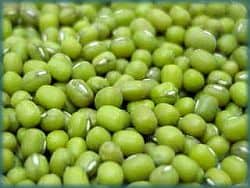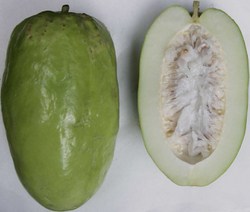The durian is the fruit of several tree species belonging to the genus Durio and the Malvaceaefamily (although some taxonomists place Durio in a distinct family, Durionaceae). Widely known and revered in southeast Asia as the “king of fruits”, the durian is distinctive for its large size, unique odour, and formidable thorn-covered husk. The fruit can grow as large as 30 centimetres (12 in) long and 15 centimetres (6 in) in diameter, and it typically weighs one to three kilograms (2 to 7 lb). Its shape ranges from oblong to round, the colour of its husk green to brown, and its flesh pale yellow to red, depending on the species.
The edible flesh emits a distinctive odour, strong and penetrating even when the husk is intact. Some people regard the durian as fragrant; others find the aroma overpowering and offensive. The smell evokes reactions from deep appreciation to intense disgust, and has been described variously as almonds, rotten onions, turpentine and gym socks. The odour has led to the fruit’s banishment from certain hotels and public transportation in southeast Asia.
The durian, native to Brunei, Indonesia and Malaysia, has been known to the Western world for about 600 years. The 19th-century British naturalist Alfred Russel Wallace famously described its flesh as “a rich custard highly flavoured with almonds”. The flesh can be consumed at various stages of ripeness, and it is used to flavour a wide variety of savoury and sweet edibles in Southeast Asian cuisines. The seeds can also be eaten when cooked.
There are 30 recognised Durio species, at least nine of which produce edible fruit. Durio zibethinus is the only species available in the international market: other species are sold in their local regions. There are hundreds of durian cultivars; many consumers express preferences for specific cultivars, which fetch higher prices in the market.
Benefits of Durian
- Depression
- Suicidal Depression
- Anxiety
- Insomnia
- Aggression
- Appetite (to curb the appetite)
- Pain
- Migraines
- Premenstrual Syndrome
- Bulimia
- Parkinsons’s Disease
- Obsessive-Compulsive Disorder
- Nightmares
- Stress
Health Benefits:
- Durian is extremely nutritious because it is rich in vitamin B, C and E and with high iron content. Eating durian is alleged to restore the health of ailing humans and animals.
- A preparation from its roots and leaves is prescribed by traditional doctors for fevers and jaundice.
- Decoctions of the leaves and fruits are applied to swellings and skin diseases.
- Durian fruit helps lower cholesterol.
- Durian is a strong blood cleanser.
- The ash of the burned rind is taken after childbirth.
- Durian contains high levels of the amino acid tryptophan, known to alleviate anxiety, depression, and insomnia, and create feelings of happiness, by raising levels of serotonin in the brain
- Durian contains high level of soft protein which makes it a good muscle builder.
- Durian has a reputation as a powerful aphrodisiac.
- Durian is recommended as a good source of raw fats.

